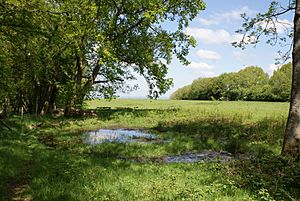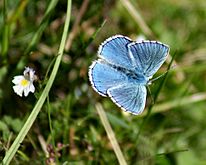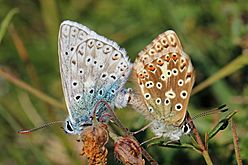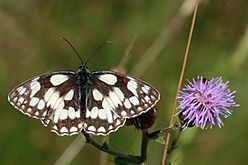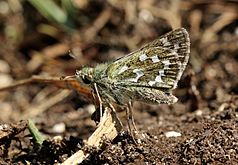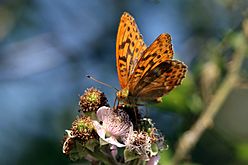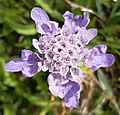Aston Rowant National Nature Reserve facts for kids
| Site of Special Scientific Interest | |
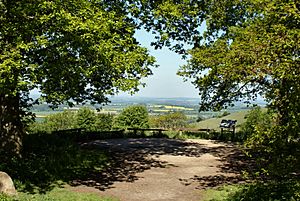
Aston Rowant NNR view from Chiltern Chalk escarpment in the reserve over Oxford Clay plain, looking west
|
|
| Area of Search | Oxfordshire Buckinghamshire |
|---|---|
| Interest | Biological |
| Area | 128.5 hectares (318 acres) |
| Notification | 1988 |
| Location map | Magic Map |
Aston Rowant National Nature Reserve is a special place in England. It's located on the side of the Chiltern Hills. This area is known for its amazing natural beauty. The reserve covers about 159 hectares (that's like 393 football fields!). Most of it is a protected area called a Site of Special Scientific Interest. This means it's super important for nature.
You can find Aston Rowant in parts of Oxfordshire and Buckinghamshire. It's famous for its unique chalk grassland. This type of land is great for many kinds of plants and butterflies. You can see beautiful orchids and the rare Chiltern gentian flower here. Many butterflies also live here, like the silver-spotted skipper and the Adonis blue.
Besides grasslands, the reserve also has woodlands. These woods are filled with trees like beech, yew, and juniper. If you look up, you might spot red kites flying high. These birds were brought back to the area and now live here.
Contents
A Home for Nature
The Aston Rowant reserve is looked after by Natural England. They get help from the Oxford Conservation Volunteers. This team works hard to protect the special habitats found here. The reserve has nationally important chalk grassland. It also has areas of juniper bushes and beautiful beech woodlands.
Amazing Wildflowers
Aston Rowant is well-known for its wildflowers. In spring and summer, the chalk grassland bursts with color. Many types of orchids grow here. These include the common spotted orchid and the pyramidal orchid. You might even see the bee orchid, which looks just like a bee!
Other pretty flowers include eyebright and marjoram. The rare Chiltern gentian and yellow-wort also add to the beauty. The land is carefully grazed by animals. This helps the wildflowers grow strong and healthy.
Beautiful Butterflies
The chalk grassland at Aston Rowant is a perfect home for butterflies. Over 30 different kinds of butterflies have been seen here! Some of the most colorful ones are the Adonis blue and the chalkhill blue. You can also spot the marbled white and the silver-spotted skipper. The dark green fritillary and silver-washed fritillary are also common.
- Butterflies at Aston Rowant NNR
-
Chalkhill blue, Polyommatus coridon
-
Silver-spotted skipper, Hesperia comma
Wild Mammals
Aston Rowant is home to several interesting mammals. You might see muntjac deer or roe deer roaming around. Brown hares also live here. The reserve is very important for the hazel dormouse. This small, cute animal is endangered, so protecting its home is vital.
Bringing Back Wildlife
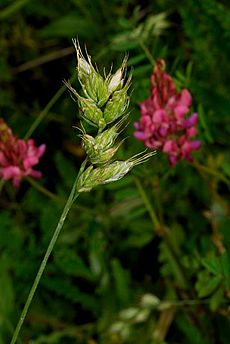
Aston Rowant has played a big role in bringing back animals and plants.
Red Kites Return
In 1989, Aston Rowant NNR was one of the first places chosen to bring back the red kite. These birds had disappeared from England and Scotland. Only a few dozen pairs were left in Wales. The RSPB and Natural England started a reintroduction program.
They brought red kites from Spain to the Chilterns. This program was a huge success! Now, about 200 pairs of red kites live here. Chicks from this area are even taken to help reintroduce red kites in other parts of the UK.
Rare Grass Reintroduced
In 2004, something amazing happened for plants. Seeds of the interrupted brome grass were planted at Aston Rowant. This grass had completely disappeared from the wild. The seeds grew successfully, and the plants thrived! This was the first time an extinct plant was brought back to the wild in British history.
More Amazing Pictures


